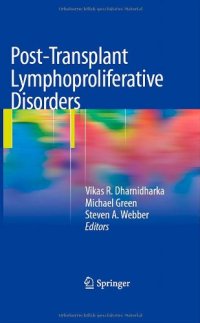
Ebook: Post-Transplant Lymphoproliferative Disorders
- Tags: Nephrology, Transplant Surgery, Oncology, General Surgery, Cardiac Surgery, Infectious Diseases
- Year: 2010
- Publisher: Springer-Verlag Berlin Heidelberg
- Edition: 1
- Language: English
- pdf
Post-transplant lymphoproliferative disorders are a group of conditions that straddle the borders between infection and malignancy. They were very rare prior to the mid-1980s but now can be expected to develop in 1-10% of transplant recipients. While some cases are reversible with reduction in immunosuppression, more severe forms are indistinguishable from frank lymphomas.
This book sets out to cover in depth every aspect of these disorders, including both basic science and clinical topics. The epidemiology is reviewed, and careful attention is paid to the role of Epstein-Barr virus in their development. Clinical features are documented and clear guidance is provided on diagnosis, with thorough description of pathologic and imaging findings. Further chapters are devoted to treatment, prognosis, preventive and pre-emptive strategies, and organ-specific considerations.
The state-of-the-art information contained in this book will aid researchers as well as the many different professionals involved in caring for patients with post-transplant lymphoproliferative disorders. The comprehensive and detailed coverage will appeal to those who already have some expertise in the field, yet the book will also serve as an invaluable resource for beginners in transplantation.
Post-transplant lymphoproliferative disorders are a group of conditions that straddle the borders between infection and malignancy. They were very rare prior to the mid-1980s but now can be expected to develop in 1-10% of transplant recipients. While some cases are reversible with reduction in immunosuppression, more severe forms are indistinguishable from frank lymphomas. This book sets out to cover in depth every aspect of these disorders, including both basic science and clinical topics. The epidemiology is reviewed, and careful attention is paid to the role of Epstein-Barr virus in their development. Clinical features are documented and clear guidance is provided on diagnosis, with thorough description of pathologic and imaging findings. Further chapters are devoted to treatment, prognosis, preventive and pre-emptive strategies, and organ-specific considerations. The state-of-the-art information contained in this book will aid researchers as well as the many different professionals involved in caring for patients with post-transplant lymphoproliferative disorders. The comprehensive and detailed coverage will appeal to those who already have some expertise in the field, yet the book will also serve as an invaluable resource for beginners in transplantation.